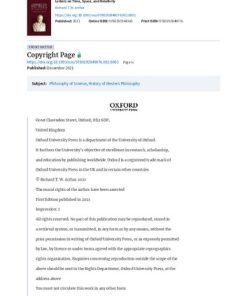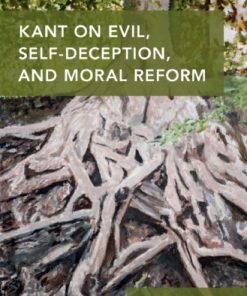Leibniz on the Problem of Evil Paul Rateau
$50.00 Original price was: $50.00.$25.00Current price is: $25.00.
Leibniz on the Problem of Evil – Ebook Instant Download/Delivery ISBN(s): 9780199996506,0199996504, 9780190054564, 0190054565
Product details:
- ISBN 10: 0190054565
- ISBN 13: 9780190054564
- Author: Paul Rateau
Paul Rateau traces the genesis and development of G.W. Leibniz’s treatment of the problem of evil, from his earliest writings through the Essays on Theodicy (1710). By investigating Leibniz’s early thinking about what evil is and where it comes from, Rateau reveals the deeply original nature of Leibniz’s later work and the challenges it raises. Rateau explores the ways in which the Theodicy’s theoretical project, which integrates numerous disciplines and various argumentative strategies, informs and is influenced by two more practical aims-justifying the end of denominational divisions between Catholics and Protestants, and inculcating “true piety” in believers. By paying equal attention to both Leibniz’s intellectual and personal development, Rateau offers a holistic view of Leibniz’s most profound and sophisticated work of philosophy.Rateau shows how the young Leibniz moves from suggesting that the author of evil is God himself to later defending an original theory of necessitarianism (in The Confession of a Philosopher), which makes God the first link in the chain of beings that constitute the world, but which ultimately denies God’s responsibility for sin. By examining Leibniz’s theoretical development after 1673, he demonstrates how Leibniz comes to a revised framework that forms the basis for the project of theodicy. After having examined the defensive and the doctrinal aspects of the Theodicy, Rateau shows how human freedom can be reconciled with divine freedom in Leibniz’s system. Newly translated from the original French edition, Rateau’s book offers a novel and important new interpretation of Leibniz and will appeal to scholars both of Leibniz and of early modern thought generally.
Table contents:
1. Difficulties Concerning the Justification of God in the Years Prior to 1673
2. The Confession of a Philosopher: Divine Justice and the Necessity of Sin
3. Theoretical Changes After the Confession of a Philosopher: Toward a New Conception of God, the Possible, and Divine Concurrence with Evil
4. The Genesis of Theodicy: Its Scientific and Apologetic Aims
5. The Best of All Possible Worlds and Divine Permission of Evil
6. Evil in Being and in the Actions of Creatures: Reality or Appearance?
7. Human Freedom and Principles of Action
People also search:
leibniz on evil
leibniz rationalism
leibniz psr
leibniz pdf
leibniz on the problem of evil
You may also like…
Uncategorized
Leibniz: General Inquiries on the Analysis of Notions and Truths Bilingual Edition Massimo Mugnai
Politics & Philosophy - Major Branches of Philosophical Study
The Problem of Evil: Eight Views in Dialogue 1st Edition N N Trakakis
Politics & Philosophy - Major Branches of Philosophical Study
Psychology - Developmental Psychology
Politics & Philosophy
Politics & Philosophy - Renaissance & Modern Philosophy
Leibniz on Time, Space, and Relativity 1st Richard T. W. Arthur
Religion & Spirituality - Christianity
John Chrysostom on Paul: Praises and Problem Passages 1st Edition
Biography & Autobiography - Essays


